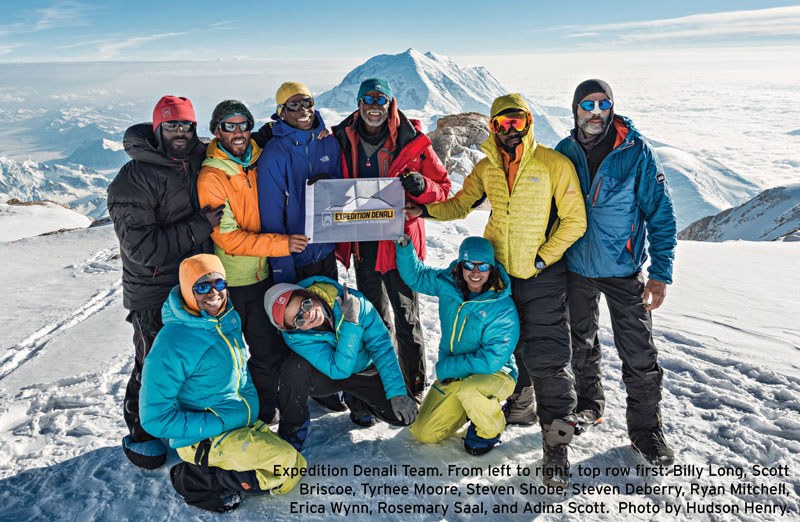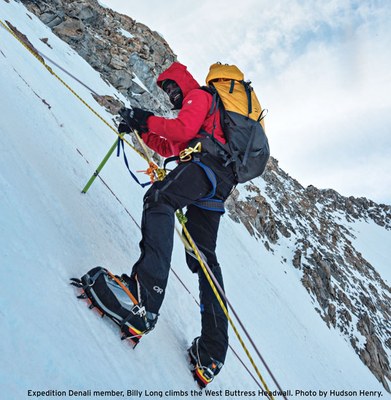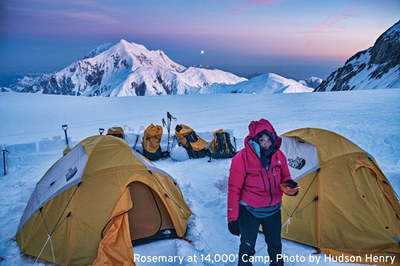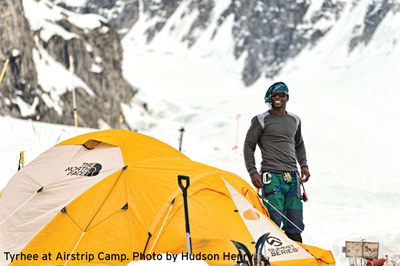
photos by Hudson Henry
We have come a long way from the early 1900’s when The Mountaineers advised women to “carry heavy veils to shield their faces from sunburn when on snow” and men used greasepaint to protect their skin. Today, we all wear the same clothes and use the same gear, but you are still more likely to see a man climbing a mountain than a woman. However, the gender gap is decreasing, and the accomplishments of female climbers are now celebrated as proudly as those of their male counterparts.
One gaping hole still exists in the outdoor recreation landscape, though: the under-representation of African-American athletes in the outdoors. Outdoor participation rates among African-Americans, especially children, remains the lowest in the nation.
This gap exists for many reasons: a lack of role models, underfunded inner city programs, wilderness access difficulties, and the sheer expense of participation, to name a few. But the good news is that progress is being made. With help from groups like Expedition Denali, the first all African-American team to attempt a climb of America’s highest peak, a new face is being given to diversity in the outdoors.
For this story I sat down with Expedition Denali team members Tyrhee Moore and Rosemary Saal to get their take on diversity in the outdoors, their ideas for possible solutions to the "diversity gap," and their suggestions for how we can ALL increase diversity in the outdoors.

Getting Started
The concept of Expedition Denali was created by the National Outdoor Leadership School (NOLS) to celebrate the 100th anniversary of Denali’s first ascent by helping a new group of climbers make their mark. NOLS brought together a group of inspiring African-Americans to blaze a trail up the mountain while paving a way for young people of color to “get outside, get active, get healthy, become passionate about America’s wild places, and chase their own Denali-sized dreams.”
Tyrhee and Rosemary were the two youngest members of the expedition, and were invited to participate because of their dedication to and passion for the outdoors.
Tyrhee first found his outdoor inspiration in 7th grade with help from his history teacher (who happened to be white). This mentor loved being active outdoors and shared his passion and photos with Tyrhee. Inspired by what he saw, the summer after 7th grade Tyrhee joined a group on a trip from his home in Washington, D.C. to Jackson Hole, Wyoming. That summer in Wyoming would forever change his life. Tyrhee went on to graduate from two NOLS courses, including an Outdoor Educator Course in the Pacific Northwest. He’s currently attending West Virginia University studying sports management.
Rosemary was born in Seattle, and has always loved getting outdoors. At an early age, she joined Passages Northwest (now GOLD – Girls Outdoor Leadership Development) to get involved in rock climbing, taking numerous courses. At 13, she moved to the East Coast and away from GOLD, but maintained her passion for wild places and returned to Seattle years later. Today she continues to volunteer with GOLD and is pursuing a degree in communications in Seattle.

Diversity in the Outdoors
Both Tyrhee and Rosemary are working hard to change people’s perceptions about getting outside. The harsh reality is that mountaineering began as a white male sport and largely remains so today. “It’s a matter of representation and stereotypes,” Tyrhee said when I asked him about the phenomenon. “People just don’t think about taking a group of African-American students outside. A lot of times it's not even brought up. They just say, 'Oh, let's just start a basketball team,' and don't think about something like a rock climbing group or a hiking club.”
Rosemary expanded on this, saying, "Mountaineering is an activity lacking color and diversity, which can be really discouraging for a young boy or girl of color. It's so important to see someone who looks like you and who you identify with doing something that you want to do." Black people don’t see others who get outside and therefore they don’t get outside — ultimately this underrepresentation becomes a self-fulfilling prophecy. Not only that, but most African-Americans think of climbing as a “white sport.” Both Tyree and Rosemary have been called "white" for their participation in mountaineering, something they find frustrating — but also motivating.
“I mean, I'm the furthest thing from white,” Tyrhee said. “And I'm clearly doing it — I’m getting outside. It's not something that ‘white people do’. It's something that EVERYBODY does. And even though you aren't doing it, you should do it. It almost makes me want to work harder to expose more people to doing what I love the most.”
Rosemary, who defines herself as half-white and half-black, has a bit of a different take on it. She agrees it’s wholly exasperating when people call her white for climbing, or make similar types of inferences, but ultimately she thinks it's a shame that different activities are associated with different colors of your skin. “A concerted effort needs to be made to make sure that we’re spreading the love of the outdoors to everyone,” she said.
Role Models
The natural world offers different things to different people, and communicating their excitement is what makes this dynamic team so successful. For Rosemary, nature equals empowerment. "Reaching the really remote Cascades on foot made me feel proud and confident and like I could do anything," Rosemary said. She feels the lessons gained outside continue to relate to her everyday life. "It's like this: you’ve got a hard test coming up and you just think, ‘Yo I got this. I climbed that huge mountain! This is nothing.’”
For Tyrhee, being outside helps him build immediate, close, strong friendships. He also really cherishes the time away from technology. “It’s grounding to have time to really reconnect with yourself,” he says.
When we talked it was truly evident just how much personal satisfaction both Rosemary and Tyrhee glean from their time outside, and how honored they feel to have participated in such an inspiring project. Tyree still answers emails and has long text conversations with some of the kids he’s spoken to, answering questions about the best types of outdoor summer camps and where to find more opportunities to get outside. He feels honored to be included in these conversations.
The concept of being a role model when you're in your very early 20s can be daunting. These two impressive young people carry the torch well. While getting used to their new responsibilities, both Rosemary and Tyrhee talked about speaking in front of groups whose attitudes clearly changed over the course of the presentation. They find this instant transformation truly motivational.
Shaping the Future
While the struggle to bring more diversity to the outdoors is an uphill battle, the future is far from bleak. Rosemary and Tyrhee hope to see changes in the outdoors in their lifetime. Just like climbing a mountain, they’re laying the groundwork now to see the fruits of their labor in the future. It won’t be an immediate change, but the slow and steady approach is already delivering results.
Rosemary and Tyrhee have already seen an impact in their close community of friends. I joked that they were like the “gateway drug” to the outdoors and Rosemary was quick to agree. “Yes, we’re the drug of naturally produced endorphins in the land of greenery!” she said.
Ultimately it’s all about access and equality — opportunities should be equally available to everyone. The good news is we can ALL work to be a gateway to the outdoors. Like Tyrhee’s white history teacher, all of us can spread our passion for the outdoors simply by sharing it with others regardless of race or our own preconceptions. We can open doors by encouraging excited exchanges about the things we love with everyone.
It remains especially important to create opportunities to introduce young people the outdoors. "I think the most important thing is just introducing it to kids," Tyrhee said. "Make rock climbing walls available at schools and create after school programs to get kids outside in the first place. How are you going to convince someone to go out and sleep in the woods for four days if they haven't spent a night outside in their entire life?”
For his part, Tyrhee is spending this summer working at the camp in Jackson Hole where he first discovered the outdoors, and someday he hopes to go back to Denali. Rosemary is still volunteering with GOLD to teach middle school girls climbing while passing on other skills that will serve them throughout their lives. They hope to continue to inspire people to get outside by emphasizing just how incredibly rewarding these experiences can be. “Showing people the transformative power of outdoor experiences is our ultimate goal,” she said.
Towards the end of our interview I asked, “Do you feel you were more quickly bonded with your Expedition Denali teammates because you were all African-American?” They both thought about it for minute and then agreed, “No, we weren’t.” They felt their love for the outdoors bonded them much more quickly than the color of their skin. At the heart of it, they were united not by their common ancestral background, but by their true love and passion for the outdoors.
And ultimately, aren’t we all?
This article originally appeared in our July/August 2014 issue of Mountaineer magazine. To view the original article in magazine form and read more stories from our bi-monthly publication, click here.
 Kristina Ciari Tursi
Kristina Ciari Tursi
